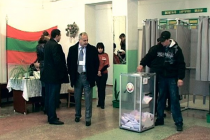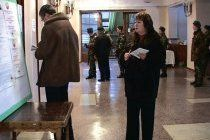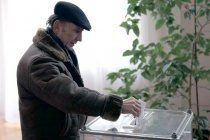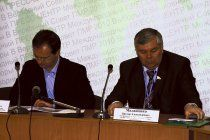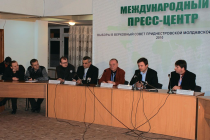 Русский
Русский English
English-







The history of the parliamentary elections - 2010 in figures and facts
On December 12, 2010, the Pridnestrovian people elected deputies to the PMR Supreme Council of the 5th convocation. 42.6% of voters took part in the 2010 parliamentary elections, this is 7% lower than when voting for the IV composition of the PMR Supreme Council. The number of candidates for deputy mandates has also decreased. Only 127 people reached the end of the election race, while in 2005 there were 180 candidates.
53 were heads of various enterprises and organizations, 32 were civil servants, 8 were representatives of public associations, 14 were unemployed, 5 were pensioners, and 4 were individual entrepreneurs among the candidates who took part in the elections to the V convocation of the Supreme Council of the PMR.
According to the results of the vote, thirteen heads of various private enterprises were elected to the PMR Supreme Council, six parliamentarians were representatives of a large industrial sector, nine people represented agricultural production and the processing industry. It is worth noting that for the V convocation, nine agrarians is a fairly significant figure, and the largest in the entire history of parliamentary elections. Representation of public figures has also expanded.
In general, 18 new deputies appeared in the Supreme Council of the PMR in the 5th convocation. A serious “change of staff” took place in Bendery - out of 8 deputies, five were elected for the first time. The list of newcomers included 4 out of 12 legislators in Tiraspol, in Slobodzeya - 3 out of 8. Speaking about the age composition of the deputies, 72% of them were from 40 to 54 years old. There were only 8 young parliamentarians, two of them were not yet 30 years old.
The elections were attended by 94 international observers. Their main task was to ensure a fair electoral process that was in line with generally accepted international standards for the protection of civil and political human rights. Among the organizations that followed the progress of the elections in Pridnestrovie was a group formed by an international public organization called the Federation of Peace and Accord. It included 14 representatives of non-governmental organizations from 12 countries of the CIS and the European Union, including Russia, Ukraine, Moldova, Belarus, Bulgaria, Germany and other countries.
International observers were guided by legislation of the republic and completely ruled out the possibility of any influence on the outcome of the vote, that is, they did not interfere in the internal affairs of our state. On election day, they visited many polling stations, including Tiraspol, Bendery, as well as villages of Slobodzeya and Grigoriopol districts. Observers from the Federation of Peace and Accord noted the good organization of the Pridnestrovian voting process, its openness and accessibility, high professional training of the members of the election commission. They emphasized: people went to the vote openly and freely, they knew their candidates.
As a result of the work, the observers prepared reports on how the elections were held in Pridnestrovie. They also adopted two statements - the Mission of observers from non-governmental organizations of the Russian Federation and the CIS countries and the Mission of foreign (international) observers. The documents reflected the joint statement of the missions that the electoral legislation of Pridnestrovie fully complies with international standards, and also provides an opportunity for holding free, and most importantly, democratic elections. The statements also noted that the very fact of inviting international experts was regarded by them as the desire of the Pridnestrovian leadership to ensure transparency and democratic elections. These documents informed the international community about the political processes taking place in the unrecognized states, in particular, in our republic.
The Russian State Duma and the Venice Commission (European Commission for Democracy through Law) recognized the Election Code of the PMR as complying with European standards. Nevertheless, the international community refused to recognize the Pridnestrovian elections as legal. International observers noted that the work of the PMR CEC was open and transparent. Equal conditions were created for all candidates, the electoral rights of citizens of the republic were observed. Observers of both missions in their statements confirmed that the elections to the Supreme Council of the PMR were held in accordance with the electoral legislation in force in the country and in conditions of equal political competition. These documents stated that the 2010 parliamentary elections became an important factor in the stable development and further democratization of public life of the republic.


